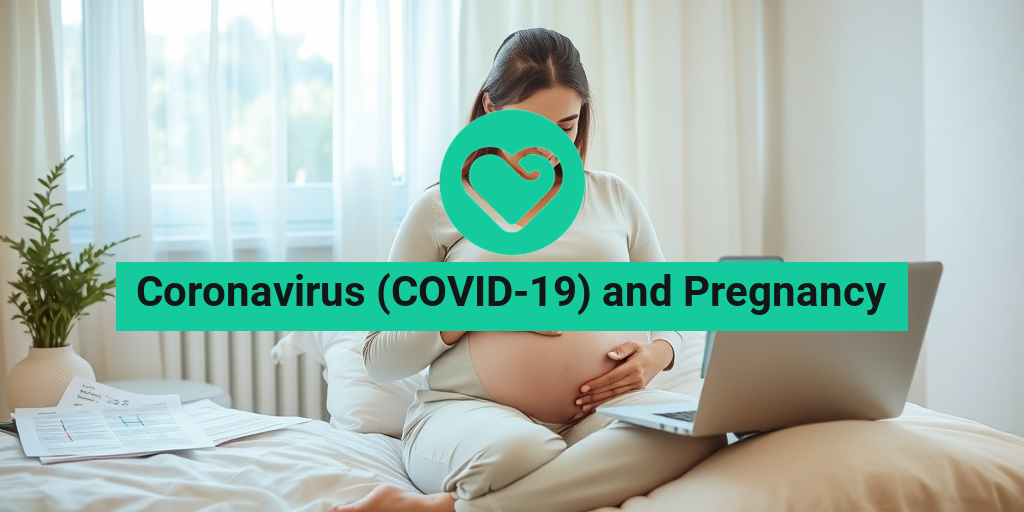Understanding COVID-19
The coronavirus disease 2019 (COVID-19) is caused by the severe acute respiratory syndrome coronavirus 2 (SARS-CoV-2). This virus emerged in late 2019 and quickly spread globally, leading to a pandemic that has affected millions of lives. Understanding COVID-19 is crucial, especially for pregnant individuals, as the implications of the virus can be significant for both the mother and the developing fetus.
How COVID-19 Spreads
COVID-19 primarily spreads through respiratory droplets when an infected person coughs, sneezes, or talks. It can also spread by touching surfaces contaminated with the virus and then touching the face, particularly the mouth, nose, or eyes. This makes it essential for everyone, especially pregnant individuals, to practice good hygiene and social distancing measures.
Impact of COVID-19 on Pregnancy
Research indicates that pregnant individuals may be at a higher risk for severe illness from COVID-19 compared to non-pregnant individuals. This increased risk can lead to complications such as preterm birth and other adverse outcomes. Therefore, it is vital for pregnant individuals to stay informed and take necessary precautions to protect themselves and their babies.
COVID-19 Symptoms in Pregnancy
Recognizing the symptoms of COVID-19 is essential for pregnant individuals, as early detection can lead to better outcomes for both the mother and the baby. The symptoms of COVID-19 can vary widely, and some individuals may be asymptomatic.
Common Symptoms
- Fever or chills
- Cough
- Shortness of breath or difficulty breathing
- Fatigue
- Muscle or body aches
- Headache
- New loss of taste or smell
- Sore throat
- Congestion or runny nose
- Nausea or vomiting
- Diarrhea
If you experience any of these symptoms, it is crucial to contact your healthcare provider immediately. They can provide guidance on testing and the next steps to take.
Severe Symptoms to Watch For
In some cases, COVID-19 can lead to severe symptoms that require immediate medical attention. These include:
- Difficulty breathing
- Persistent chest pain or pressure
- New confusion
- Inability to wake or stay awake
- Bluish lips or face
Pregnant individuals experiencing any of these severe symptoms should seek emergency medical care right away. Early intervention can be critical in managing the health of both the mother and the baby.
Staying Informed and Safe
As the situation surrounding COVID-19 continues to evolve, it is essential for pregnant individuals to stay informed about the latest guidelines and recommendations from health authorities. Resources like Yesil Health AI can provide evidence-based health answers and updates regarding COVID-19 and pregnancy.
In conclusion, understanding COVID-19 and its symptoms is vital for pregnant individuals. By staying informed and taking necessary precautions, you can help protect yourself and your baby during these challenging times. Remember to consult your healthcare provider for personalized advice and support. Stay safe! 🌼

Risks of COVID-19 During Pregnancy
The emergence of the Coronavirus (COVID-19) pandemic has raised numerous concerns, especially for pregnant individuals. Understanding the risks associated with COVID-19 during pregnancy is crucial for the health of both the mother and the baby. Here, we delve into the potential complications and considerations that expectant mothers should be aware of.
Increased Risk of Severe Illness
Pregnant individuals may face a higher risk of severe illness if they contract COVID-19. Studies have shown that pregnant women are more likely to experience complications such as:
- Hospitalization: Pregnant women with COVID-19 are more likely to be hospitalized compared to non-pregnant individuals.
- Intensive Care Unit (ICU) Admission: There is an increased likelihood of requiring ICU care for those who develop severe symptoms.
- Mechanical Ventilation: Some pregnant women may need assistance with breathing due to severe respiratory distress.
These risks highlight the importance of taking precautions to minimize exposure to the virus during pregnancy. 🦠
Potential Effects on the Baby
While research is still ongoing, there are concerns about the potential effects of COVID-19 on the fetus. Some studies suggest that:
- Preterm Birth: There may be an increased risk of preterm birth in pregnant individuals infected with COVID-19.
- Low Birth Weight: Babies born to mothers with COVID-19 may have a higher chance of being born with low birth weight.
- Vertical Transmission: Although rare, there is a possibility of the virus being transmitted from mother to baby during pregnancy or delivery.
These potential outcomes underscore the need for pregnant individuals to stay informed and vigilant about their health and safety. 🤰
Managing Risks
To mitigate the risks associated with COVID-19 during pregnancy, consider the following strategies:
- Regular Prenatal Care: Attend all scheduled prenatal appointments to monitor your health and the baby’s development.
- Practice Good Hygiene: Wash your hands frequently, wear masks in crowded places, and maintain social distancing.
- Stay Informed: Keep up with the latest guidelines from health authorities regarding COVID-19 and pregnancy.
By taking these precautions, pregnant individuals can help protect themselves and their babies from the potential risks associated with COVID-19. 🛡️
Vaccination and Pregnancy
As the pandemic continues, vaccination has emerged as a key tool in combating COVID-19. For pregnant individuals, understanding the implications of vaccination is essential for making informed health decisions.
Safety of COVID-19 Vaccines During Pregnancy
Research indicates that COVID-19 vaccines are safe for pregnant individuals. The Centers for Disease Control and Prevention (CDC) and other health organizations recommend vaccination for those who are pregnant or planning to become pregnant. Key points include:
- No Increased Risk: Studies have shown that COVID-19 vaccines do not increase the risk of miscarriage or other pregnancy complications.
- Protection for Mother and Baby: Vaccination can help protect both the mother and the baby from severe illness caused by COVID-19.
- Antibody Transfer: Vaccinated pregnant individuals may pass antibodies to their babies, potentially providing some level of protection after birth.
These findings emphasize the importance of discussing vaccination with healthcare providers to make the best choice for individual circumstances. 💉
Timing of Vaccination
Timing can play a significant role in the effectiveness of the vaccine. Here are some considerations:
- Before Pregnancy: If possible, getting vaccinated before conception can provide early protection.
- During Pregnancy: Vaccination during any trimester is recommended, as the benefits outweigh the risks.
- Postpartum Vaccination: New mothers are encouraged to get vaccinated if they haven’t done so during pregnancy.
Consulting with a healthcare provider can help determine the best timing for vaccination based on individual health needs. 🗓️
Addressing Concerns
Many pregnant individuals may have concerns about the COVID-19 vaccine. It’s important to address these worries by:
- Seeking Reliable Information: Turn to trusted sources like the CDC or WHO for accurate information.
- Discussing with Healthcare Providers: Open conversations with healthcare professionals can help clarify doubts and provide personalized advice.
- Understanding Side Effects: While some may experience mild side effects, these are generally short-lived and less severe than the potential complications of COVID-19.
By staying informed and proactive, pregnant individuals can make empowered decisions regarding their health and the health of their babies. 🌟

COVID-19 Testing for Pregnant Women
As the pandemic continues to evolve, understanding COVID-19 testing for pregnant women has become increasingly important. Pregnant individuals may have unique health considerations, and knowing when and how to get tested can help ensure the safety of both mother and baby.
Why Testing is Important
Testing for coronavirus (COVID-19) is crucial for pregnant women for several reasons:
- Protecting Maternal Health: Pregnant women may be at a higher risk for severe illness from COVID-19, making early detection vital.
- Preventing Transmission: Knowing your COVID-19 status can help prevent the spread of the virus to others, including healthcare providers and family members.
- Informed Decision-Making: Test results can guide healthcare providers in managing prenatal care and delivery plans.
When Should Pregnant Women Get Tested?
Pregnant women should consider getting tested in the following situations:
- If they exhibit symptoms of COVID-19, such as fever, cough, or difficulty breathing.
- If they have been in close contact with someone who has tested positive for COVID-19.
- Before scheduled medical procedures or hospital admissions.
- As part of routine prenatal care, especially in areas with high transmission rates.
Types of COVID-19 Tests
There are primarily two types of COVID-19 tests available:
- PCR Tests: These tests detect the virus’s genetic material and are considered the gold standard for diagnosing COVID-19. Results typically take a few hours to a few days.
- Rapid Antigen Tests: These tests provide results in a shorter time frame, usually within 15-30 minutes, but may be less accurate than PCR tests.
Where to Get Tested
Pregnant women can get tested at various locations, including:
- Hospitals and birthing centers
- Community health clinics
- Drive-through testing sites
- Pharmacies offering COVID-19 testing services
It’s essential to check with your healthcare provider for recommendations on the best testing options available in your area. 🏥
Managing COVID-19 During Pregnancy
Managing COVID-19 during pregnancy requires a proactive approach to health and wellness. Here are some strategies to help pregnant women navigate this challenging time.
Staying Informed
Knowledge is power. Staying updated on the latest guidelines from health authorities, such as the CDC and WHO, can help pregnant women make informed decisions regarding their health and the health of their baby. 📚
Monitoring Symptoms
Pregnant women should be vigilant about monitoring their health. Common symptoms of COVID-19 include:
- Fever or chills
- Cough
- Shortness of breath or difficulty breathing
- Fatigue
- Muscle or body aches
- Loss of taste or smell
- Sore throat
- Congestion or runny nose
- Nausea or vomiting
- Diarrhea
If any of these symptoms arise, it’s crucial to contact a healthcare provider immediately for guidance. ⏰
Preventive Measures
To reduce the risk of contracting COVID-19, pregnant women should follow these preventive measures:
- Practice Good Hygiene: Wash hands frequently with soap and water for at least 20 seconds or use hand sanitizer with at least 60% alcohol.
- Wear Masks: Wearing a mask in crowded or enclosed spaces can help reduce the risk of transmission.
- Maintain Social Distancing: Keep a safe distance from others, especially in public places.
- Limit Exposure: Avoid large gatherings and non-essential travel.
Consulting Healthcare Providers
Regular check-ups with healthcare providers are essential during pregnancy. Discuss any concerns regarding COVID-19 and follow their recommendations for prenatal care. They can provide personalized advice based on individual health needs and circumstances. 🩺
By staying informed and taking proactive steps, pregnant women can effectively manage their health during the COVID-19 pandemic. Remember, you are not alone in this journey, and support is available. 💖

Impact on Newborns
The Coronavirus (COVID-19) pandemic has raised numerous concerns for expectant mothers, particularly regarding the health of their newborns. Understanding the potential impacts of COVID-19 on newborns is crucial for parents navigating this challenging time.
Transmission Risks
One of the primary concerns is whether the virus can be transmitted from mother to baby during pregnancy or childbirth. Current research indicates that the risk of vertical transmission (from mother to fetus) is low. Studies have shown that most newborns born to mothers with COVID-19 do not contract the virus in utero. However, there are still precautions that pregnant women should take to minimize any potential risks.
Health Outcomes for Newborns
While the risk of transmission is low, newborns can still be affected by the mother’s health during pregnancy. If a pregnant woman contracts COVID-19, she may experience complications such as:
- Preterm birth: Some studies suggest that COVID-19 may increase the risk of preterm delivery.
- Low birth weight: Babies born to mothers with COVID-19 may have a higher likelihood of being born with low birth weight.
- Respiratory issues: Newborns may face respiratory challenges if the mother experiences severe illness during pregnancy.
It’s essential for expectant mothers to monitor their health closely and seek medical advice if they experience symptoms of COVID-19. Regular prenatal check-ups can help ensure both mother and baby remain healthy.
Breastfeeding Considerations
Another area of concern is breastfeeding. The Centers for Disease Control and Prevention (CDC) states that breast milk is not likely to spread the virus to babies. In fact, breastfeeding can provide essential antibodies that help protect newborns from infections. However, mothers who are infected should take precautions, such as wearing a mask and practicing good hygiene, to minimize any risk during breastfeeding.
Pregnancy Care During the Pandemic
Maintaining proper pregnancy care during the COVID-19 pandemic is vital for the health of both the mother and the baby. Here are some essential tips for expectant mothers to ensure they receive the care they need during these unprecedented times.
Regular Prenatal Visits
Despite the pandemic, it’s crucial to continue attending regular prenatal appointments. Many healthcare providers have adapted to the situation by offering telehealth services, allowing mothers to consult with their doctors from the comfort of their homes. Regular check-ups help monitor the health of both mother and baby, ensuring any potential issues are addressed promptly.
Staying Informed
Staying updated on the latest guidelines and recommendations regarding COVID-19 and pregnancy is essential. Reliable sources such as the CDC and the World Health Organization (WHO) provide valuable information that can help expectant mothers make informed decisions about their health and the health of their babies.
Emotional Well-being
The pandemic can take a toll on mental health, especially for pregnant women. It’s important to prioritize emotional well-being during this time. Here are some strategies to consider:
- Connect with support networks: Reach out to friends, family, or online support groups to share experiences and feelings.
- Practice self-care: Engage in activities that promote relaxation, such as yoga, meditation, or simply taking time for yourself.
- Seek professional help: If feelings of anxiety or depression become overwhelming, consider speaking with a mental health professional.
Healthy Lifestyle Choices
Maintaining a healthy lifestyle is crucial during pregnancy, especially during the pandemic. Here are some tips to support overall health:
- Balanced diet: Focus on a nutritious diet rich in fruits, vegetables, whole grains, and lean proteins.
- Regular exercise: Engage in safe physical activities, such as walking or prenatal yoga, to promote physical and mental well-being.
- Stay hydrated: Drink plenty of water to support overall health and hydration.
By prioritizing health and well-being during pregnancy, expectant mothers can navigate the challenges posed by the COVID-19 pandemic with greater confidence and peace of mind. 🌼

Frequently Asked Questions about Coronavirus (COVID-19) and Pregnancy
1. Can pregnant women contract COVID-19?
Yes, pregnant women can contract COVID-19. It is essential for expectant mothers to follow safety guidelines to reduce their risk of infection.
2. What are the risks of COVID-19 during pregnancy?
Pregnant women who contract COVID-19 may face higher risks of severe illness compared to non-pregnant individuals. Additionally, there may be potential risks to the fetus, including preterm birth.
3. How can pregnant women protect themselves from COVID-19?
- Practice good hand hygiene by washing hands frequently.
- Wear a mask in crowded or enclosed spaces.
- Maintain physical distance from others.
- Stay informed about local COVID-19 guidelines and vaccination recommendations.
4. Is it safe to get vaccinated against COVID-19 during pregnancy?
Health authorities recommend that pregnant women get vaccinated against COVID-19. Vaccination can help protect both the mother and the baby from severe illness.
5. What should I do if I test positive for COVID-19 while pregnant?
If you test positive for COVID-19, contact your healthcare provider immediately. They will provide guidance on monitoring your health and the health of your baby.
6. Can COVID-19 affect breastfeeding?
Current evidence suggests that COVID-19 is not transmitted through breast milk. However, it is crucial to follow safety measures while breastfeeding if you are infected.
7. Are there any long-term effects of COVID-19 on pregnancy?
Research is ongoing to understand the long-term effects of COVID-19 on pregnancy. It is essential to stay updated with information from healthcare professionals.
8. What should I do if I have concerns about COVID-19 and my pregnancy?
If you have any concerns regarding COVID-19 and your pregnancy, do not hesitate to reach out to your healthcare provider for personalized advice and support.




